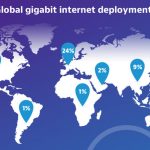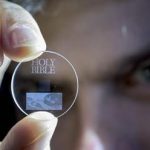Say, what's going on at Intel Capital Global Summit 2016?

San Diego, Calif. As a general rule I never connect to public WiFi networks, which is fine except when attending an event at a hotel ballroom where T-Mobile cellular is like an apparition dancing around a Halloween grave. So as Wendell Brooks, CEO of Intel Capital, begins his speech, I sit typing narrative offline rather than tweeting live. There’s irony, I suppose, reporting old style, about investments in new innovations.
Welcome to the trials and travails of the Intel Capital Global Summit, which kicks off today and goes through October 26. Looking at the lineup, I expect to hear about newfangled tech that would make news reporting so much easier if available—although 4G cellular data would be good enough for today.
Stephen Hawking believes AI could be mankind's last accomplishment

According to Stephen Hawking, artificial Intelligence (AI) and its possible implementations need to be managed with the utmost care in order to prevent its power from falling into the wrong hands or being used in a way that does not benefit mankind as a whole.
The renowned physicist stressed the point that AI could be used to commit deplorable acts in the form of powerful autonomous weapons and other ways in which people in power could use the technology to oppress and control a majority of the population.
The legal challenges for autonomous vehicles

Gartner described 2015 as the peak of the driverless car "hype cycle", as the battle between established car manufacturers and technology companies intensified to produce driverless or autonomous vehicles. However the driverless car phenomenon has escalated very quickly in recent months with Uber, Google and now traditional car manufacturer Ford having announced their plans to create and test self-driving vehicles, and rumors surfacing of Apple acquiring McLaren.
The US has also recently issued Federal proposed guidelines setting out 15 benchmarks car manufacturers will need to meet before their autonomous vehicles can hit the road. Ford is currently developing in-car connectivity, ride-sharing and autonomous technologies through its subsidiary; Ford Smart Mobility (FSM) and will launch its self-driving car by 2021. This vehicle will come without a steering wheel, an accelerator or pedals -- an image of a car that was probably unimaginable a decade ago and the battle for the dashboard becomes easier to imagine.
What you need to know about quantum computing

Most people will be familiar with Moore’s Law which states that the number of transistors it’s possible to get on a microprocessor doubles every 18 months. If this holds true it means that some time in the 2020s we’ll be measuring these circuits on an atomic scale.
You might think that that’s where everything comes to a juddering halt. But the next step from this is the creation of quantum computers which use the properties of atoms and molecules to perform processing and memory tasks.
What you need to know about cognitive computing

The ability to think is one of the things that marks us out as human, "I think therefore I am", as the philosopher René Descartes put it. But what if machines were able to mimic human thought processes? This is the basic premise behind cognitive computing.
In order to replicate human thought processes, cognitive computing uses techniques like pattern recognition, data mining and natural language processing. The ultimate goal is to be able to make computer systems that are capable of solving complex problems without needing human assistance to prompt them in the right direction. Computing giant IBM, which is one of the leaders in the field, describes this as "systems that learn at scale, reason with purpose and interact with humans naturally".
This is why gigabit internet is such a big deal

You’re watching the Game of Thrones episode you’ve been looking forward to all week, and just when you get to the pivotal scene, the stream cuts out, forcing you to adopt the salty language the show itself is known for. Your slow internet connection and your modem might face your wrath! Deep breath. Keep calm. Changes are afoot and internet connections are getting faster. How much faster?
Gigabit internet is the next generation of broadband technology and it is 159 times faster than the global average of 6.3 Mbps. A cross section of wired and wireless operators are all racing to deploy gigabit connectivity to feed our insatiable appetite for bandwidth. After all, Game of Thrones is renowned for building whole new worlds that were hardly possible on a television show just a few years ago, and communication service providers realize they’ve got to keep up.
Moon Express gets FAA 'approval' for Moon mission

Last week Moon Express, a contender for the Google Lunar X-Prize (GLXP), announced that the company had received interagency approval from the White House, Federal Aviation Administration (FAA), Department of State and other U.S. government agencies "for a maiden flight of its robotic spacecraft onto the Moon’s surface to make the first private landing on the Moon".
This heady announcement got a lot of press including this story I am linking to because it was in the New York Times, the USA’s so-called pape of record. If the Times writes "gets approval to put robotic lander on the Moon" it must be true. Only this story isn’t true. Yes, the FAA kinda-sorta gave Moon Express permission to land on the Moon. But by the same token, the FAA has no power to deny Moon Express -- or anyone -- the right to land on the Moon. It’s not in their jurisdiction.
What new tech will you see in your lifetime?

Technology has already shaped the world we live in. Things like television, the jet engine and the first computers have made major changes to the way we live our lives.
But what can we expect in the future? The pace of change is faster than ever and there are innovations on the horizon that will change our lives just as radically as those of the past.
Researchers store music video in DNA strain

Researchers from Microsoft and the University of Washington managed to store a high-definition music video by OK Go into a DNA strain. This is actually much more serious than it sounds.
A team of scientists and researchers stored 200 megabytes of data on a molecular strand, and thus set a new record. A bunch of data was added, including digital versions of works of art, the Universal Declaration of Human Rights in more than 100 languages, the top 100 books of Project Guttenberg and the non-profit Crop Trust’s seed database. Knowing IoT and Big Data are on the way, having a long-lasting and reliable data storage solution is essential.
Bluetooth 5 is on the way: twice the speed, four times the range, and location-awareness

Due to be announced next week on June 16, Bluetooth 5 has a great deal to offer. Ahead of the announcement, Bluetooth Special Interest Group executive director Mark Powell has revealed a little about what we can expect.
The headline-grabbing specifications for the latest version of the wireless standard are a quadrupling of the current range, and a doubling of the current speed. Slightly less exciting is the change in naming convention which is a move to simplify the communication of major changes, but another key feature of Bluetooth 5 is support for location-aware services.
Business leaders: Anticipating future tech trends is not in our job description

Business leaders understand the importance of data analytics, and will do what it takes to make sure their company’s data needs are met. However, they don’t think they should be anticipating future trends in order to take full advantage of any upcoming opportunities.
Those are the results of a new study conducted by The Economist Intelligence Unit (EIU), and sponsored by Microsoft Cloud. The study is entitled Transforming Business, and says that 67 percent of survey respondents (including IT leaders, HR leaders, finance and sales & marketing people), are "somewhat" or "very" confident about their department’s ability to use data.
Searching for a nanotech self-organizing principle

One of the frustrations of nanotechnology is that we generally can’t make nano materials in large quantities or at low cost, much less both. For the last five years a friend of mine has been telling me this story, explaining that there’s a secret manufacturing method and that he’s seen it. I’m beginning to think the guy is right. We may finally be on the threshold of the real nanotech revolution.
Say you want to build a space elevator, which is probably the easiest way to hoist payloads into orbit. Easy yet also impossible, because no material can be manufactured that is strong enough to make an elevator cable to space. The weight of the cable alone would cause too much tensile stress: it couldn’t carry itself, much less a commercially-viable payload, too. Some exotic new material is required, one with a strength-to-weight ratio beyond any present material, even spider silk. So we talk about space elevators, we have conferences about space elevators, we draw picture after picture of space elevators, yet we can’t make one. Or couldn’t… until now.
Bioo charges your phone from a potted plant

You probably know that you can use a potato as a battery and power clocks and small light bulbs from it. You don’t have to use a potato either -- certain other vegetables and fruits work just as well.
Arkyne Technologies claims that plants can also be used as a power source, and has produced a product called Bioo Lite which is able to use leafy green flora to charge devices, like smartphones and tablets. The company is currently seeking finance for its invention on Indiegogo where it has already hit 112 percent of its funding goal with a month to go.
Eternal 5D nanostructured glass optical discs hold 360TB of data and last billions of years

Storing data is extremely important for many situations. Businesses often need to retain information for legal purposes, while home users cherish things like family photos and heirloom recipes. For many people, utilizing flash drives, optical media, or the cloud is sufficient. I prefer redundancy -- cloud and local data.
What if you need to store a lot of data? I'm talking, like, a lot of friggin' data. Well, your needs may be met by a new invention from the University of Southampton. Not only can its newly announced Eternal 5D nanostructured glass discs hold 360TB of data, but they can last billions of years too. Hell, these discs could possibly outlive the Earth and its sun!
Microsoft's Lego-like PC makes upgrading super-easy

Part of the reason the PC was originally so successful is down upgradability, and that’s still a factor today. If your computer starts to run a little sluggish, you can always add more RAM, or swap your HDD for an SSD. Some PCs are easier to upgrade than others, but Microsoft is looking into a way to make upgrading so easy that absolutely anyone could do it.
The idea is a modular computer that consists of magnetic units that you can snap off without the use of tools and replace with newer, better components. Not unlike building a PC from Lego.
Recent Headlines
Most Commented Stories
BetaNews, your source for breaking tech news, reviews, and in-depth reporting since 1998.
Regional iGaming Content
© 1998-2025 BetaNews, Inc. All Rights Reserved. About Us - Privacy Policy - Cookie Policy - Sitemap.